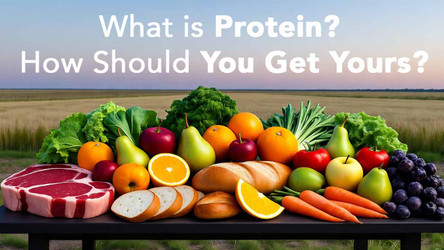Protein: The Right Way to Get It
11th Oct 2025
PROTEIN: THE RIGHT WAY TO GET IT BASED ON YOUR BODY TYPE
Perhaps the most important macronutrient for your body, protein is a fundamental piece of nearly every organ, function, and detox pathway in your body.
Ensuring that you are getting the right types of protein, the right amounts, and organically sourced, ensures that your body can not only function but thrive.
Protein’s Fundamental Roles in Your Body Include:
- Providing the raw material you need to build and repair your cells, tissues, organs and more. This includes proteins like collagen - essential for connective tissues health, hair and skin health, and more;
- Enzyme creation to augment your bodies ability to metabolize everything from digestive juices, energy, and even DNA.
- Transporting and Storing oxygen, nutrients, hormones, and waste products. Proteins are useful for carrying nutrients into cells and waste products out through the cell membrane.
- Your Immune System builds antibodies out of proteins, making them vital for fighting off illness and disease.
- Hormone Production allowing your body to produce estrogen, testosterone, insulin and beyond, ensuring your body’s rhythms and functions happen efficiently and effectively.
- Muscle building, repair, and movement is performed through the use of proteins.
- Energy source when your body doesn’t have carbohydrates present. In many autoimmune cases, eliminating carbohydrates temporarily from your diet helps your body, cells, and mitochondria to reset and heal. In this case, your body move to using proteins to create its energy.
Microbiome Connection:
- Some proteins are not digested by your bodies enzymes and escape into the gut where they are fermented by the microbiome to produce short-chain fatty acids, and branched chain amino acids.
- Gut Microbiome breaks down the proteins into amino acids and can synthesize new protein from these components. Your microbiome can utilize protein to also alter nutrient availability, and affecting your overall metabolism.
Key Organs to Support When Focusing Of Protein Intake:
Your whole body works with proteins starting in the stomach where protein is metabolized into peptides. From here your pancreas works with your small intestine and your microbiome to break peptides down into amino acids and send these building blocks out into your bloodstream. The amino acids then enter your liver to be made into the new proteins compositions to be used through out your body to create everything from blood to muscles to hormones to skin cells. As this process unfolds, proteins move waste products out of your cells and tissues back into the blood to be filtered out by your kidneys.
Pros and Cons of Plant Based Proteins vs Meat Based Proteins
Plant Based Diets:
If you’re focused on getting your protein from plants-based sources, there are a lot of pros as well as some important cons to note:
Plant based diets offer a good mix of amino acids, prebiotic fiber, and antioxidants, but come with a collection of anti nutrients that can irritate your gut lining and cause bloating. Making sure to get the right balance of macronutrient rich to micronutrient rich plant based proteins, while supporting your microbiome with healthy prebiotic fibers and probiotics creates an ideal balance of digestion.
Rich in phytonutrients, antioxidants, and detox augmenting prebiotic fibers, plant based proteins can support a thriving microbiome, and support a health peristalsis, leading to healthy and regular formed stools.
Occasionally, those suffering from autoimmunity have to limit their plant based foods as they can temporarily trigger more autoimmune responses or feed bad bacteria that have taken hole in your microbiome.
Another benefit of eating plant-based protein is that they come without any cholesterol load, but as a result they can trigger a higher blood sugar/insulin response. So be sure to talk to your health care provider about what is ideal for you. At certain time of our lives avoiding heavier fats is best, while at other times, avoiding heavier carbs is best.
Plant-based diets contain less B12, iron, and omega 3’s, and some supplementation may be necessary. However, this diet can have lower calories than a meat based diet and can aid in weight management by supporting a healthy microbiome with the rich prebiotic fibers.
Also, eating a plant-based will lower your carbon footprint when compared to eating from the factory farming of animals. Further, there are less animal welfare concerns with plant-based diets as the impact of ending the life a larger, more sentient being like a cow is a heavier burden to most than the rodent and insect impact that comes from the tilling soil and mono-cropping.
But, it is very important to source your plant-based protein from as many diverse sources as possible that grow ORGANIC, as eating plant-based non-organic or GMO foods can come with greater risk of exposure to pesticides, herbicides, gluten, processed foods, or heavy metals. So be sure to eat organic and avoid supporting mono cropping wherever possible.
As we source our plant-based ingredients we always make sure they are organic, non-gmo, allergen free. So ingredients require huge cropping, so we offset this impact by supporting the smallest suppliers we can, and donating to organic, artisan seed bank, and ethical and educated purveyors of reforestation. Finally we donate to small, interest free loan providers who focus on provided organic farmers access to cash loans with no interest.
Meat Based Diets:
If you’re focused on getting your protein from meat then there are a lot of pros and cons to also be aware of.
Meat based diets tend to provide a complete proteins, as they come with all essential amino acids in the ideal ratios. Meat has some components of micronutrients that are more bioavailabe than plant based proteins, but over consumption of them can put too much pressure on the kidneys and intestines, slowing down your peristalsis, and causing constipation.
Meat based diets are rich in Iron, b12, zinc, and creatine, but come with higher saturated fats and cholesterol. They can also come with hidden antibiotics that will directly affect your microbiome too.
Meat-based diets tend to be more satiating and curb hunger cravings for much longer, particularly helpful for those looking to eat less meals in their day, but can stop up your digestion much easier. Further, meat is generally cheaper per gram of protein than plant based but does not come with the prebiotic fibers, or as nearly a wide variety of antioxidants.
Meat is very high in nutrient density, but comes with the potential of higher environmental impact poor grazing practices, and ethical issues of ending the life of a high sentient being for food.
Our suggestion for Plant vs Meat Protein: Both at the right times in the right amounts for your unique body and priority of ethics.
Generally a balanced diet containing both plant and animal based proteins is ideal. They are synergistic, each taking up the slack of the other. A combination diet is more dynamic, as it lends itself to the changing seasons (and all of the changes that happen in your body as a result).
If you’re open to the combined diet then you are more prepared to react to changes in your body’s needs. As stated before, in certain cases of autoimmunity, shifting to a more meat based diet can help your body reset it’s insulin sensitivity, heal your brain and neuron firing, and put autoimmunity into remission.
However there is a big difference between individuals’ needs, and a huge difference between the needs of men and women. In general, women need a diet more full of complete and complex carbohydrates as it helps the big changes that occur in their hormone expression during the four phases of their menstruation. Also, in general women who are still menstruating and wanting to boost their fertility benefit from eating earlier in the day than men, shortening their intermittent fasting windows, and eating less animal based protein.
It depends on you. I personally know a handful of women who have had significant gains in their health by doing carnivore/keto diets, while also knowing the majority of our female clients who have the best results in their health by going majority plant based.
In general, with the men I know, most have benefited from a balanced daily or weekly diet that is 50-50, 60-40 ratioed, with very helpful resets from both keto/carnivore and large intermittent fasting windows (particularly in Summer and Fall) balanced by a later in the year return to a higher prebiotic rich fiber diet (particularly in Spring).
Insect proteins are not something I am familiar with, though I have heard they come full of toxins present in insects’ exoskeletons that are poisonous for humans. More research needed in all of the above regards. Please reach out to me with anything you’ve found to be helpful, particularly in your diet choices and transformations.
Easiest Method to Get Healthy Protein:
Our Meal Replacement Protein Powders provide a nutrient dense source of protein. Our unique combination of plant-based proteins and micronutrients is designed to give you highly assimilable, easy to digest protein that satisfies your for hours and boosts your microbiome.
Our most loved proteins include Pacha Protein, and light tasting vanilla protein ready in seconds in just a bit of plant-based milk that will leave you feeling full and light for hours. Also, is our Cacao Plus! Chocolate Protein full of antioxidants and super greens, that boosts your energy and calms your nerves.
Regardless of your choice of protein, we hope you're thriving. Our plant-based proteins work AMAZING for those who want to be 100% Plant Based and have thousands of 5/5 star testimonials, and they are also fantastic combinations with those doing the combo of plant and animal based.
Feel free to contact me with any questions. My name is Joshua :) 9702592110. care@sarvaaorganics.com
Remember we offer bulk pricing here.

